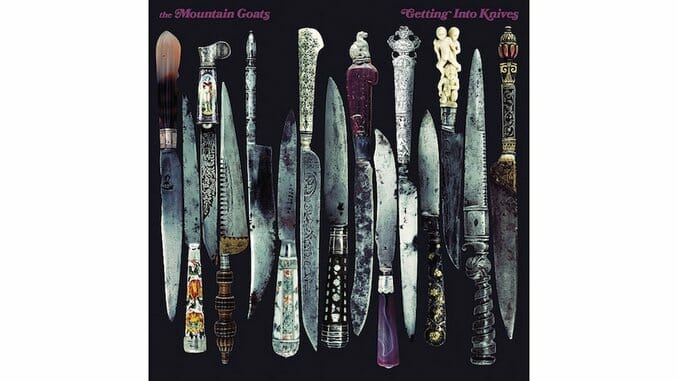Your Shadow Has Something To Show You: How The Mountain Goats Help
On their latest LP, John Darnielle & co. once again deep dive into the human situation

“How you gonna win when you ain’t right within?” Lauryn Hill once asked. This is a challenge to live by, a challenge so heavy that it’s hard to keep it at the forefront of consciousness. A question like this can only be faced through relentless self-examination, through trying to open up the book of what all happened, where you’re at, and what it is, exactly, you’re hoping for. Pop music has occasioned this kind of heavy reflection from the get-go and all along (“Do I really feel the way I feel?” Marc Cohn, “Walking In Memphis”), but nobody cracks the old psyche open quite like The Mountain Goats. They help us deal with ourselves. And in the COVID era, their latest effort, Getting Into Knives, comes at us as a nervous breakthrough that seems almost knowingly calibrated to address and give voice to the sense of unease that seems to saturate all possible perception. With Peter Hughes, Matt Douglas and John Wurster, John Darnielle deep dives into the human situation, finding the words that find the feeling. And over the course of 13 songs, the spell they cast confers a dark blessing that seems driven by a rare, intuitive conviction: Your shadow has something to show you.
Recorded within a single week with microphones purloined from the ruins of The Nashville Network, Getting Into Knives brought the band to Sam Phillips Recording, former haunt of The Cramps as well as Elvis of Tupelo. These two iconic bookends are deeply in keeping with the range of sound on offer. Producer Matt Ross-Spang enlisted the Rev. Charles Hodges, whose Hammond B-3 gave rise to Al Green’s sound as well as the Memphis trumpeter Tom Clary, and there’s a rockabilly feel alongside soul and even country, but no one genre is discernible for long. It’s as if The Mountain Goats contain multitudes and so can you. This method for seeing self and others more clearly is on offer on the album’s hardest-driving number, “As Many Candles As Possible.” Even under duress, one touch of nature makes the whole world kin, and, if we have an eye for them, kinship rituals can be spied arising before us throughout our everyday campaigns:
”When you see the risen beast in you nightmares
You treat him like a long, lost brother
But when you pass him on the streets of the city by day
You pretend you don’t recognize each other.”
Overcoming the temptation to dissociate from the beast without and within is among John Darnielle’s signature moves. Why front at the sight of danger when you don’t have to? If light is scarce in what Darnielle has referred to as a “data-poor environment,” compassion is called for. This includes a lobster, wolves, fish, and pigs, as well as human beings whose experience differs, whether slightly or radically, from our own.
Something like this imaginative practice is exemplified in every song on the album. Take “Picture of My Dress,” for instance. What began as a writing prompt on Twitter, initiated by the poet Maggie Smith provoked a reply which turned into a song John Darnielle imagined aloud would be better tackled by Mary Chapin Carpenter. From there, Darnielle conjures and gives voice to a divorcee travelling across the country taking pictures of her wedding dress in different contexts and locations. She pauses in the bathroom of a Burger King to note the presence of Aerosmith’s Steven Tyler on an overhead speaker (“He doesn’t want to miss a thing”), takes in the sights with a determined open-handedness, and also considers the challenge she faces as she tries to recover a sense of self: “I’m going to have to chase down the remnants of something special that you stole from me.”